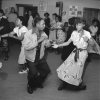Film
Bergman Unveiled
This retrospective survey of the work of renowned Swedish filmmaker Ingmar Bergman reveals a pratice rooted in the conventions of theatre and music, and propelled by a characteristically Nordic blend of humanism, mysticism and existential anguish. Film curator Ron Foley Macdonald has selected eleven key works from a lifetime's production of over fifty films.
21 January - Smiles of a Summer Night
1955, 108 minutes, b & w
The inspiration for Stephen Sondheim's musical A Little Night Music and Woody Allen's feature film A Midsummer Night's Sex Comedy, Bergman's Smiles of A Summer Night is itself inspired by Shakespeare's A Midsummer Night's Dream. Romance, intrigue and magic confuse couples at a party in a country estate.
28 January - The Seventh Seal
1957, 96 minutes, b &w
Bergman's signature film is set in Sweden during the middle ages. The characters, however, reflect strikingly modern existential attitudes. A knight, returning from the Crusades, plays chess with Death while a family of performers pass through a plague-ridden village. Spiced with earthy humour to offset the central tone of spiritual anguish, The Seventh Seal is one of the greatest achievements of the cinema.
4 February - Through a Glass Darkly
1961, 91 minutes, b & w
A meditation on faith, family and maddness. Through a Glass Darkly follows a contemporary island-bound writer and his children as they confront their own visions, ghosts and apparitions.
11 February - Winter Light
1963, 80 minutes, b & w
One of Bergman's most austere pictures, Winter Light is the story of a priest who no longer believes, and one of his flock whom he fails to save. Set in the severity of the Scandanavian winter, it is nevertheless a strangely illuminating work.
18 February - Persona
1966, 81 minutes, b & w
Perhaps Bergman's most daring film, Persona delves deeply into the psyche of two women -- an actress who has gone mute and her attendant nurse, eventually merging both together.
25 February - Shame
1968, 110 minutes, b & w
One of Bergman's overlooked masterpieces, Shame is set during a vicious civil war in an un-named country. Two semi-retired musicians get caught up in the conflict, forcing their sense of humanity to the sidelines as they struggle for basic survival.
17 March - The Passion of Anna
1969, 101 minutes, colour
Bergman's first film in colour, shot by the creat cinematographer Sven Nykvist, is a stark story based around a love quadrangle. The four characters are portrayed by Bergman's favourite actors: Liv Ullmann, Max von Sydow, Bibi Andersson and Erland Josephson.
24 March - Cries and Whispers
1972, 106 minutes, colour
Again with Sven Nykvist, Liv Ullmann, Bibi Andersson and Erland Josephson, Bergman tells the story of a dying, deeply repressed upper-class woman while she is attended by her sister and her emotionally compromised maid.
31 March - The Magic Flute
1974, 134 minutes, colour
In this joyous departure, Bergman adapts a vibrant and enchanting screen version of Mozart's earthy opera.
7 April - Autumn Sonata
1978, 97 minutes, colour
Ingmar Bergman directs Ingrid Bergman in this tale of a concert pianist visiting her daughter (played by Liv Ullmann) for the first time in seven years.
14 April - Fanny and Alexander
1983, 197 minutes, colour
Bergman's own family history unfolds in turn-of-the-century Sweden. Sumptuous costumes and sets barely disguise the filmmaker's trademark themes of alienation and wonder. Fanny and Alexander was supposed to be Bergman's final film (in fact it was followed by After the Rehearsal, 1984 and In the Presence of a Clown, 1997); his family's story continued in scripts for other directors, such as The Best Intentions, Sunday's Children and Private Confessions.




